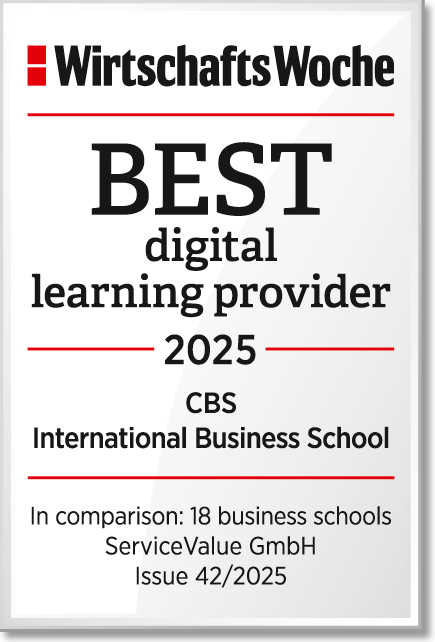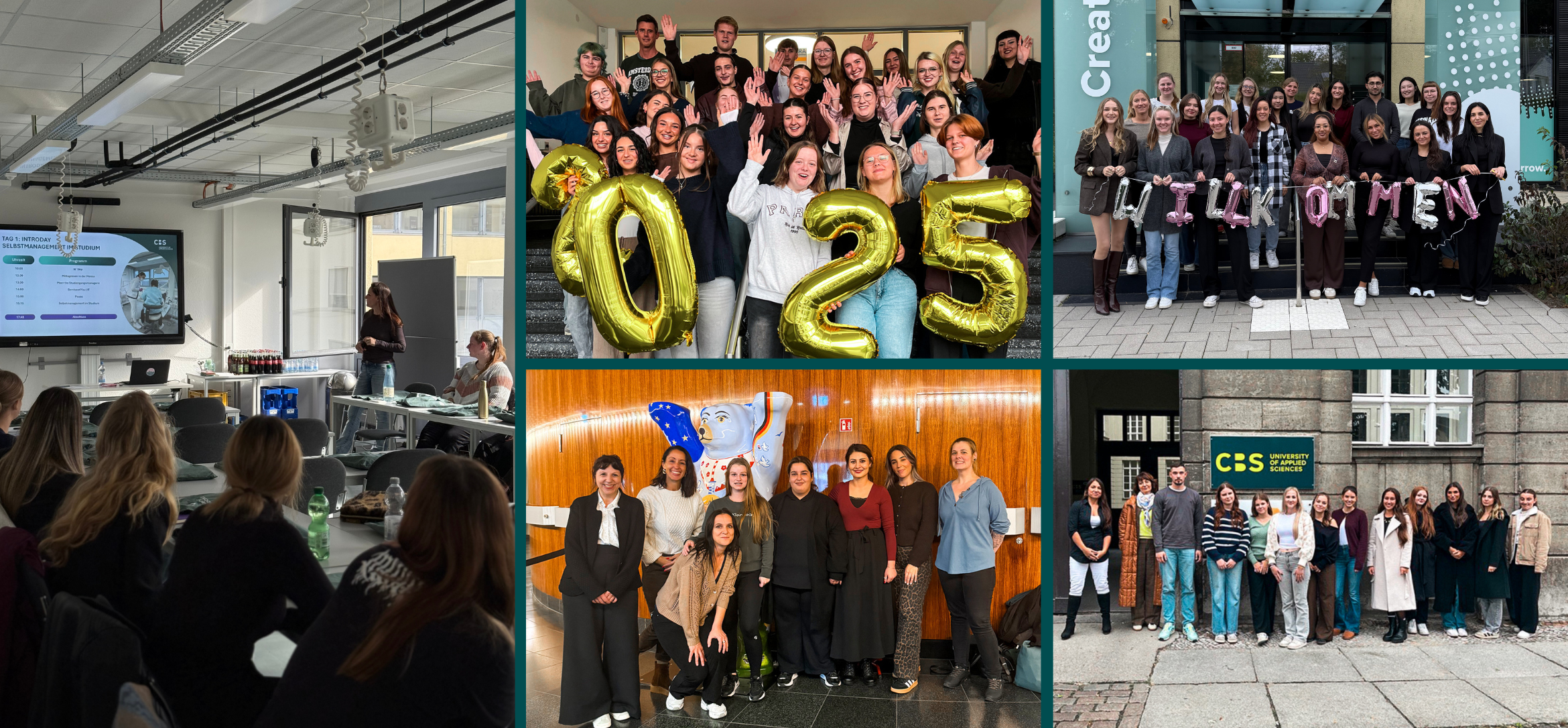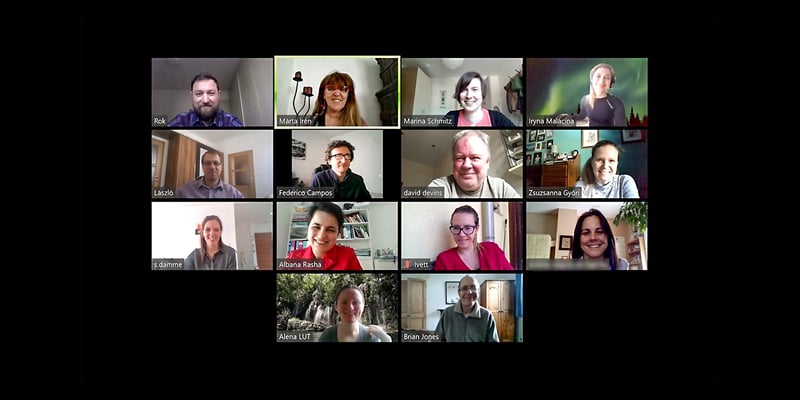Your Human Resources Degree
Discover talent, develop teams and drive business success – start your HR Management programme now!

People at the Heart – with an HR Management Programme at CBS!
Successful companies are built on qualified and motivated employees – and that’s where professional HR management comes into play. HR managers not only ensure the targeted recruitment of suitable talent but also foster their development to fully realise each individual’s potential. This includes planning and implementing training measures that are essential for long-term employee retention and performance enhancement.
At the same time, digitalisation is playing an ever-growing role in the workplace. Modern HR management designs innovative work processes and supports the digital transformation within a company. As a central interface, it significantly contributes to business success.
In the HR Management programme, you acquire the necessary expertise and skills to nurture employees effectively, lead teams strategically, and develop sustainable HR concepts.

Tailor Your Human Resource Management Programme Flexibly – Full-time, Dual or Part-time
Our flexible study models adapt perfectly to your life circumstances. Whether dual, part-time or full-time – find the model that suits your goals.

Dual
The dual programme at CBS combines academic theory with practical application in a company. This way, you gain valuable work experience and secure excellent career prospects. Your studies are practical, future-oriented and funded by your partner company.

Part-Time
Studying while continuing to grow professionally – the part-time programme at CBS makes it possible. Flexible learning formats and practical content enable you to advance your career deliberately. Your next career step – without compromise.
HR Management Degree Programmes at CBS – Your Future in Human Resources
Are you looking for an HR Management degree that prepares you perfectly for a career in Human Resources? Whether Bachelor’s or Master’s, explore our HR programmes and find your ideal course.

General Management

Campus Berlin
Campus Hamburg
Campus Cologne
Campus Mainz
Campus Rheine
Campus Rostock
Campus Solingen
Campus Neuss

Business
Finance Management
Logistics Management
Marketing
Human Resources
Business Psychology
Technology Management
Entrepreneurship
Sales Degree


Get Your Free Brochure!
Are you interested in studying Human Resources Management and want to learn more? Our free brochure provides all the key details about course content, career opportunities, and admission requirements. Get all the information you need now and take the next step towards your future!

FAQs about the HR Management Degree – Everything You Need to Know!
Are you interested in an HR Management degree but still have unanswered questions? Here, you’ll find answers to the most important topics – from course content to entry requirements.
Find out what to expect in your studies and whether this programme is the right fit for you!
What is Human Resource Management?
HR management is a branch of business administration that focuses on work and personnel. Essentially, it involves strategies, measures, and areas of action designed to support a company’s development. HR management is divided into five key areas: leadership, strategy, planning and organisation, personnel control, and personnel development. Since every employee contributes to a company’s success, they are regarded as an important asset.
You can find more information in our blog post on “What is Human Resource Management?”.
What can I expect from an HR Management programme?
Your HR Management studies prepare you for a diverse and demanding professional future. As an HR manager, you combine economic topics with people-focused work. Your responsibilities include providing, developing, and optimally utilising human resources.
Excellent HR management is a crucial success factor for any organisation – making you a highly sought-after professional on the job market. During your studies, you will tackle recruiting, employer branding, and employee motivation. The business administration knowledge you gain is indispensable, supplemented by specialised content such as business mathematics, personnel development, project management, organisational and work psychology, and leadership.
Is an HR Management programme right for me?
An HR Management course is ideal if you enjoy working with people and possess strong interpersonal skills as well as an acute understanding of human behaviour. Communication and persuasion skills are as important as empathy, assertiveness, and conflict management. Additionally, numerical aptitude, an interest in mathematics, and foreign languages will serve you well.
Responsibility, organisational talent, resilience, and flexibility are essential qualities to succeed in this dynamic and multifaceted field.
What does the HR Management programme cover? What will I learn?
In an HR Management programme, you acquire solid business and strategic knowledge to recruit, develop, and retain employees effectively. You learn to develop modern HR strategies, optimise work processes, and manage change.
Bachelor’s Programme:
You receive a foundational education in business studies, including subjects such as business administration, commercial law, accounting, statistics, and microeconomics. Specific HR topics include corporate management, talent acquisition, training & development, employer branding, and human resource management. In addition, you learn leadership techniques, diversity management, and negotiation methods.
Master’s Programme:
You can specialise in areas such as Digital Leadership, Intercultural HR, and HR 4.0. Advanced topics include Business Economics, Corporate Social Responsibility, employment law, and coaching. Complementary subjects such as international project management, communication, creativity, and innovative thinking prepare future leaders for modern workplace challenges.
What are the entry requirements for an HR Management programme?
The entry requirements depend on the qualification pursued:
Bachelor’s programme: Requires a general university entrance qualification (e.g., A-levels, IB Diploma, or equivalent). Proof of English language proficiency is also required via a certificate (valid for two years) or by taking the CBS free online English test.
Master’s programme: Requires a Bachelor’s degree (or equivalent) in a business-related subject with a minimum grade of “good” (if lower, an admissions test may be necessary). A Numerus Clausus is not required.
How is the HR Management programme structured?
The duration and structure of the HR Management programme vary by qualification.
Bachelor’s Programme:
Lasts six or seven semesters and can be pursued full-time or as a dual course. Depending on the programme, lectures are offered in German or English. In addition to theoretical foundations, CBS places great emphasis on practical experience: business projects with companies, simulations, and integrated practical phases prepare you specifically for professional life. There is also the possibility of an internship or an exchange semester. The programme concludes with a bachelor’s thesis, awarding you the title Bachelor of Arts (B.A.).
Master’s Programme:
Lasts four or five semesters and can be taken full-time or part-time alongside employment. Lectures are also offered in German or English. During the programme, you deepen your subject knowledge and apply it in business projects, case studies, and simulations. There is also the option to complete an internship or exchange semester. The programme concludes with a master’s thesis, conferring the title Master of Arts (M.A.).
HR Careers: What can I do with an HR Management degree?
Upon graduating from an HR Management programme, numerous career opportunities become available. Your skills are in high demand across various sectors. For instance, you could work as an HR Officer, Personnel Developer, HR Cost Planner, Coach, HR Coordinator, HR Business Partner, or HR Consultant.
What can I expect to earn after an HR Management programme?
Salaries in HR management vary. As an entry-level professional, you can expect an annual salary of approximately €32,000 gross. With further qualifications and experience, annual salaries around €45,000 gross are attainable. On average, the annual salary in HR management is about €38,000 gross.
Where can i study HR Management?
Discover locations
Discover the diversity of CBS University of Applied Sciences with locations into wholly Germany
Ob pulsating big city or regional vicinity — find the campus that's right for you
Each location combines modern Campus life, innovative Study rooms and option on exciting career opportunities. Discover the place that fits your goals and start your journey towards a successful future.
Your studies, right where thou thee unfold Would like to.
request a brochure now!
Get your free brochure and learn more about:
- Admission requirements
- Application process
- Study formats and time models
- Study programmes and course content
- Semester abroad opportunities
- Financial aid options
Success!
Any questions? We're here to help
Do you have any questions about our bachelor's or master's degree programs? Our Student Advisory team is here to support you! Schedule your personal consultation—online or in person—for tailored, non-binding guidance on finding the right study program for you.

Discover our diverse fields of study
Discover our diverse fields of study – from health and social sciences to education and business. Explore innovative study programs tailored to your career goals, helping you succeed in a dynamic job market.
































































































































































